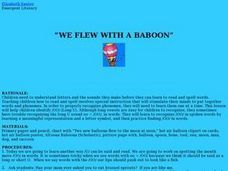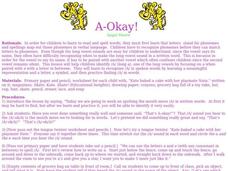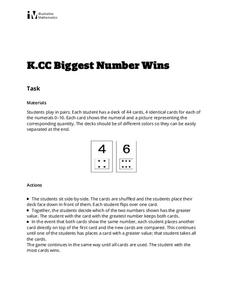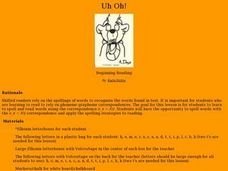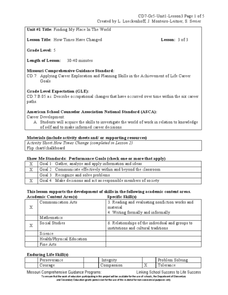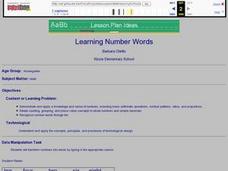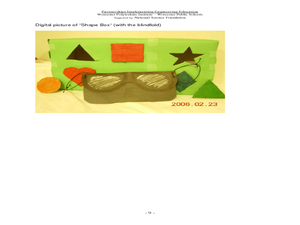EngageNY
Numbers Raised to the Zeroth Power
What in the world is the zeroth power? Examine the patterns of exponents as they apply to the zeroth power. Scholars apply the zero property to simple exponential expressions in this fourth lesson plan in a series of 15. The examples...
Curated OER
Recognizing Patterns
Students explore the concept of patterns. In this patterns instructional activity, students use applets to manipulate tessellations. Students predict the next number in a sequence by recognizing patterns.
Curated OER
Identifying Patterns
Students investigate the elements of a pattern. In this geometry instructional activity, students identify different shapes in a pattern and discover which shapes are missing in order to extend it. Students create their own patterns...
Curated OER
Leaf Patterns
First graders explore the existence of patterns in everyday items. In this science and math integrated lesson, 1st graders match leaves with a name word card and organize them into four patterns. This lesson includes a reading of And the...
Curated OER
Adire Eleko Cloth Glue Patterns
First graders are introduced to the art form of African Adire Eleko cloth - painted patterned textiles. They use paper, glue and paint to imitate the technique and create similar patterns on paper.
Curated OER
Extending Geometric and Numeric Patterns
Young scholars study patterns. They construct growing patterns using pattern blocks and isosceles right triangles. They verbally describe the patterns and state the rule that describes the relationship involving the number of pattern...
Curated OER
Repeating Patterns
Students explore growth patterns by using manipulatives such as pattern blocks, investigate growth pattern of pattern, record growth in T-chart, describe how pattern is growing, and predict number of blocks needed to extend pattern.
Curated OER
Building Patterns
Fifth graders examine a variety of different patterns. After reading a book, they are introduced to a growing pattern and have them predict the next sequence of blocks. In groups, they are given a set of tiles in which they create a...
Curated OER
Extending Patterns
For this mathematics worksheet, 1st graders draw the shapes that they see in the pattern illustrated. Then they identify which shape comes first, which comes after the circle, and which comes after the square. Students also draw the...
Curated OER
Measuring Pattern Block Angles
Sixth graders review the rotation of 180 and 360 degrees. Using the alphabet, they estimate the angle degree and identify the angles as either right, straight, obtuse or acute. In groups, they measure the pattern block angles and record...
Curated OER
Shapes and Patterns- Kaleidoscope
Third graders create art using shapes. In this shapes and patterns lesson, 3rd graders explore multiple ways of combining shapes to create new objects and art.
Curated OER
Mother Nature Pattern Maker
Young scholars in a teacher education program enhance their awareness of patterns. They discover how to support their students in developing this skill in mathematical terms. They role play the role of a K-2 student and collect images...
Curated OER
The Five Senses
Pupils use their senses to identify a variety of items in mystery boxes after listening to a read aloud of Aliki's, "My Five Senses." They taste and smell items to identify them before completing a Senses Literature Log. They label the...
Curated OER
We Flew With a Baboon
More vowels? Elementary schoolers recognize how vowel patterns change a short vowel sound into a long vowel sound. With an emphasis on the /oo/ that makes the long U sound, kids identify the phoneme and letter combination through...
Curated OER
A-Okay
Learners distinguish between short and long vowel /a/ sounds. They are introduced to the vowel-consonant-e pattern that changes short vowel sounds into long vowel sounds. Then they practice identifying words with the vowel-consonant-e...
Curated OER
Processing Satellite Images
Learners comprehend the meaning of "pixel." They recognize patterns using pixels. Students observe how land use can be determined from a pixel. They measure off a 30 x 30-meter area to show the size of the surface area of one pixel....
Curated OER
Shape Hunt
Explore the world of shapes! After free tangram exploration and pair share time, learners describe various patterns and shapes in both the natural and designed world. They investigate the use of tangrams to create patterns and shapes.
Illustrative Mathematics
Biggest Number Wins
Engage your mathematicians with this simple number-quantity game. Working in pairs, using two decks of 44 cards numbered 0-10 with corresponding sets of objects or images, young learners will each flip a card and decide which number is...
Curated OER
Uh Oh!
Help your elementary learners distinguish between short and long vowel /o/ sounds. They are introduced to the vowel-consonant-e pattern that changes short vowel sounds into long vowel sounds. Then they practice reading and spelling words...
Curated OER
How Times Have Changed
Fifth graders work in small groups to compile job changes. They use data from the list of changes that the group generated together. Students analyze the data to determine: categories of changes, patterns or trends of changes, and future...
Curated OER
Learning Number Words
Students practice saying their numbers and identifying the words. They use whole numbers and decimals to practice grouping numbers into different categories. They write the word of the number they are shown.
Curated OER
"Name Those Vowels"
Help your class recognize the capital and lower-case forms of the five vowels. They will learn how to make capital and lower-case forms of the vowels and all the rules surrounding vowels. Fun songs and activities are included. Links to...
EngageNY
Why Do Banks Pay YOU to Provide Their Services?
How does a bank make money? That is the question at the based of a lesson that explores the methods banks use to calculate interest. Groups compare the linear simple interest pattern with the exponential compound interest pattern.
Curated OER
Recognizing the Importance of Sight
Students discover the true value of their senses. In this sight lesson plan, students discover the difficulty of life without sight by performing everyday activities without the help of their eyes. The students examine their results and...















